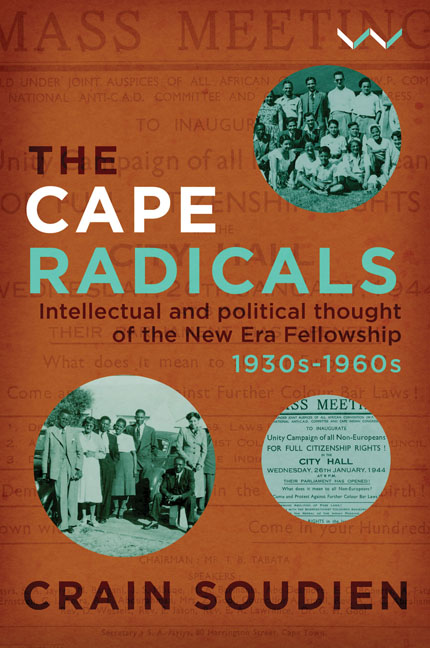Book contents
- Frontmatter
- Contents
- Acknowledgements
- Acronyms and Abbreviations
- Timeline
- Introduction
- 1 A Battle of Ideas
- 2 Planters of the Seed
- 3 ‘Anything under the Sun’: The Formation of the New Era Fellowship
- 4 ‘Honest, Sincere and Fearless’, 1937–1940
- 5 The Road to Emancipation, 1940–1953
- 6 A Cauldron of Conflict
- 7 Legacy
- Notes
- List of Illustrations
- Bibliography
- Index
6 - A Cauldron of Conflict
Published online by Cambridge University Press: 29 October 2019
- Frontmatter
- Contents
- Acknowledgements
- Acronyms and Abbreviations
- Timeline
- Introduction
- 1 A Battle of Ideas
- 2 Planters of the Seed
- 3 ‘Anything under the Sun’: The Formation of the New Era Fellowship
- 4 ‘Honest, Sincere and Fearless’, 1937–1940
- 5 The Road to Emancipation, 1940–1953
- 6 A Cauldron of Conflict
- 7 Legacy
- Notes
- List of Illustrations
- Bibliography
- Index
Summary
The closing lines of Ben Kies's A J Abrahamse Memorial Lecture, The Contribution of Non-European Peoples to World Civilisation, embodied a cri de coeur that would ring for decades in the ears of the socialist movement in South Africa. He said: ‘In the eyes of the South African Herrenvolk, segregation or apartheid, curfews, locations and the South African laws may represent civilisation, and the liberation from them a relapse into barbarism. But we, together with the majority of mankind who have seen the hateful, degenerate cannibalism to which these defenders of “Western”, “European”, “Christian” civilisation have in fact brought civilisation in the West, we think otherwise.’
The period in which Kies made his speech was in the early days of apartheid. It was neither the urbane Jan Smuts nor the intellectual descendants of a confused British ruling class that the progressive movement had to deal with, but an obdurate community of white supremacists for whom South Africa was the last remaining hope for white ‘civilisation’. The historical irony was that as Kies was bringing the thinking on race among the Cape Radicals to an apogee seen almost nowhere else on the globe, at almost the same time, the Malan-Verwoerd axis, the inheritors of Francis Galton and the eugenics movement, were putting in place the architecture and the apparatus for the world's most devastating racist project – apartheid.
There they were, the consummate theoreticians of non-racism, in the hall of St George's Cathedral in Cape Town and not even a hundred metres away in South Africa's iconic colonial Houses of Parliament were the world's most stubborn race recidivists. Two ‘culture-beds’ brought to their most fecund states. One a hothouse of nurturance, the other a laboratory of disrespect, pretentiousness and hauteur.
Within a few years of coming into power the National Party, the victors of the 1948 white election, instituted a battery of laws.
- Type
- Chapter
- Information
- Cape RadicalsIntellectual and Political Thought of the New Era Fellowship, 1930s to 1960s, pp. 145 - 162Publisher: Wits University PressPrint publication year: 2019



